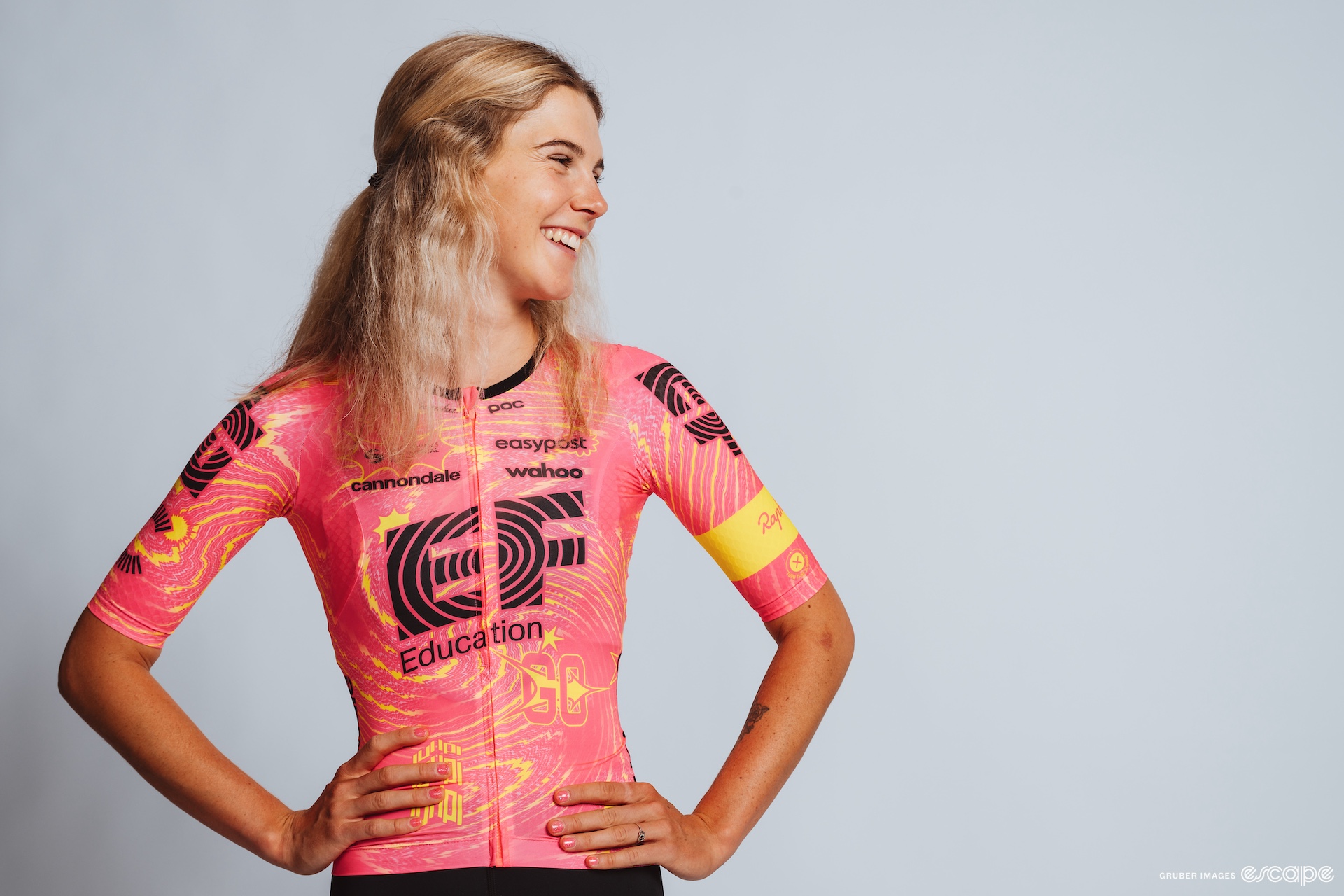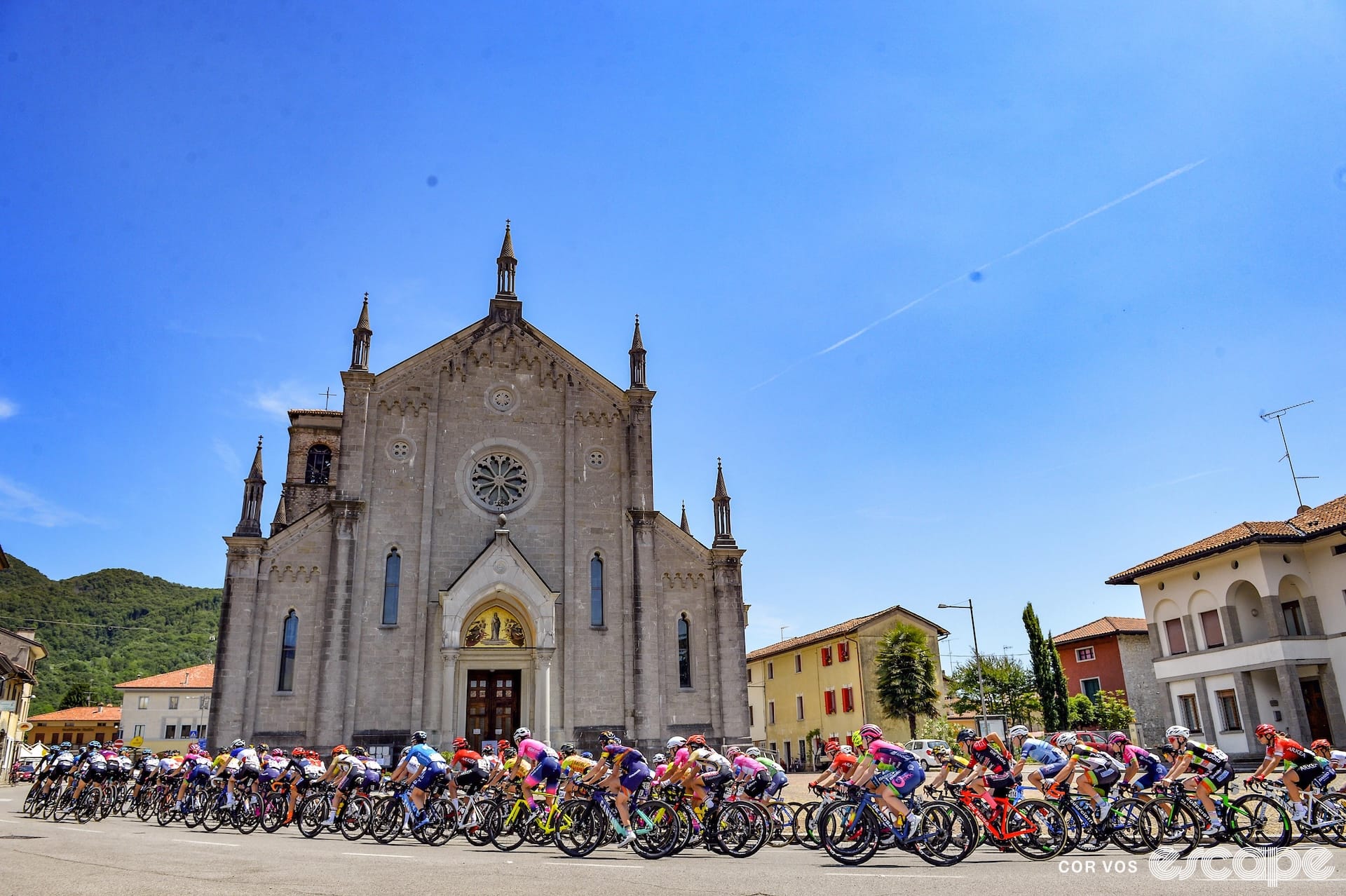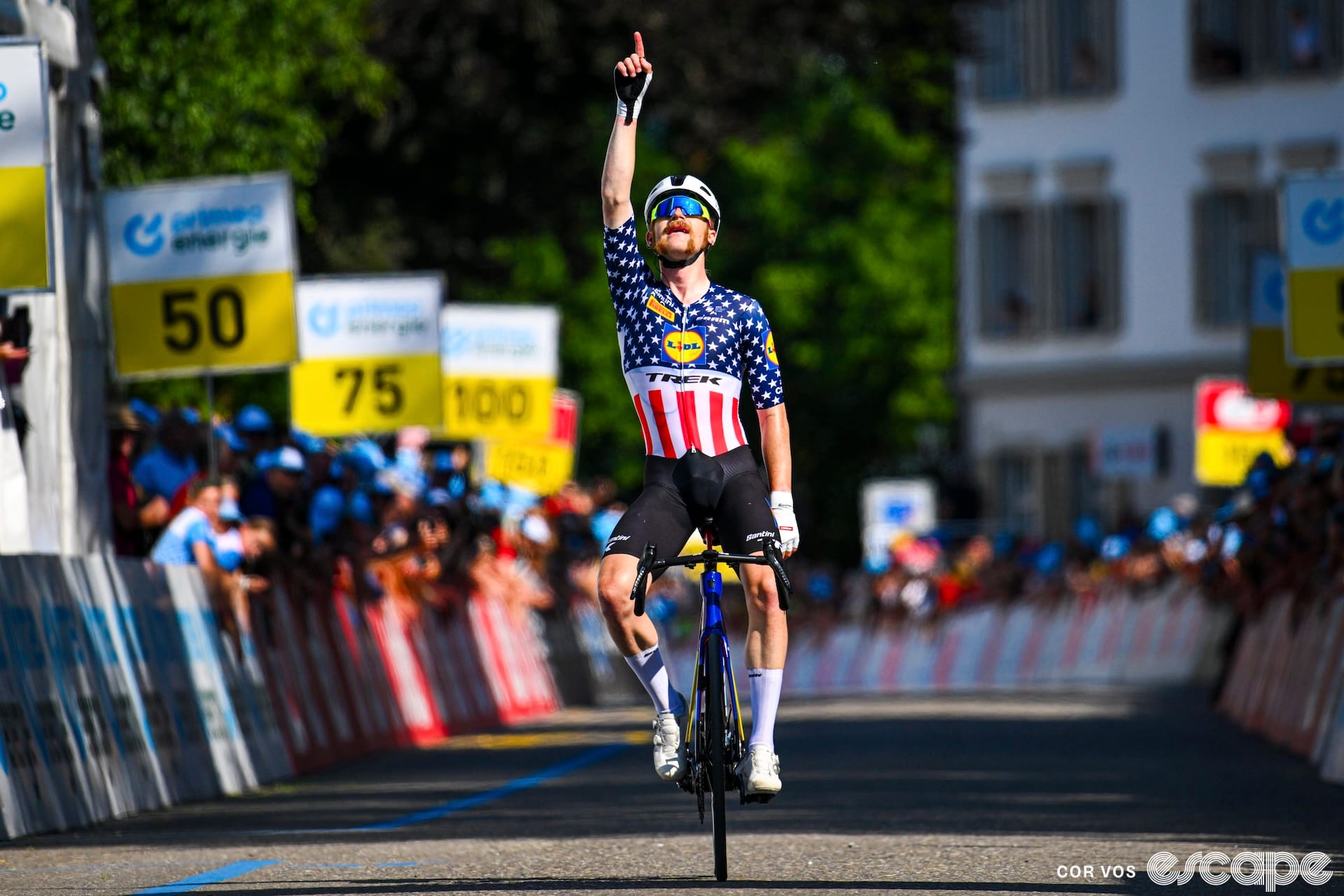After only two years in the professional peloton, Kim Cadzow will be representing her home country of New Zealand at the Paris Olympics in a few weeks' time. The last two years have been a whirlwind for Cadzow, who signed for Jumbo-Visma in 2023 after only 12 race days in Europe in 2022. The Dutch team saw her strength, but the cultural differences weren't the right fit and Cadzow ended up leaving after only one year. Now, she has found the perfect environment in EF Education-Oatly-Cannondale, a team that knows the importance of developing her, both physically and mentally.
Cadzow proved why she caught Visma-Lease a Bike's attention when she finished third in the Queen stage of the Tour of Scandinavia last season. She backed up that performance with fifth in the first stage of the recent Tour de Suisse and then finished third in the stage 2 time trial. The final stage would see Cadzow hit the ground and finish with half her jersey missing, but with her goals firmly on development, the setback wasn't as big a blow as one might think.
Cadzow's family and 'goofy' attitude contribute to her easy-going approach to the sport, but it doesn't change her position going into this year's Giro d'Italia. After turning heads at the Tour de Suisse, the Kiwi is an outside favourite, even if her team isn't putting pressure on her for a GC result.
Abby Mickey: How are you feeling post-Tour de Suisse?
Kim Cadzow: I think there was a shame because crashing, obviously, felt like the first couple of days were overshadowed [by the crash]. But then, when I look back at it, I was really happy.
I just came away with mostly one side, just a lot of [lost] skin as per usual and I bruise really badly. So my bruises look a lot worse than they actually are. But other than that, I was back on the bike pretty much straight away and it was all fine.
You know, I think if I'd been able to stay with that group, it would have been a nice finish. But it was still really cool.
AM: What part of the race are you most happy about? The time trial obviously went really well, but you were also able to stay with that group of heavy-hitters on stage 3; a group of some of the best in the world.
KC: Stage 1 was a really good day for me because I was a bit nervous to get back into the peloton and after a break after the Vuelta. I sort of was a bit too far back when Gaia [Realini] launched her first attack, so then I got a bit distanced and I sort of went up and over my limit to try and ride back to Demi [Vollering] and Gaia, and I got really close.
I was frustrated because I was there, but not quite and then I sort of blew up a bit in the end when [Elisa] Longo Borghini came past me, but I was still really happy with how that ride went.
Then the next day into the time trial, I had done a lot of planning with my coach Emma and there was something about that day that was just really special. I'd worked with her on my time trial and she's coached me from this year and we just have a really, really good relationship but I've actually never had anybody [in the follow car on the] radio in a time trial.
I felt like that day was probably one of my favourite days just because I got to have her behind me in the car coaching me the whole way and that was really special because we've got a relationship now.
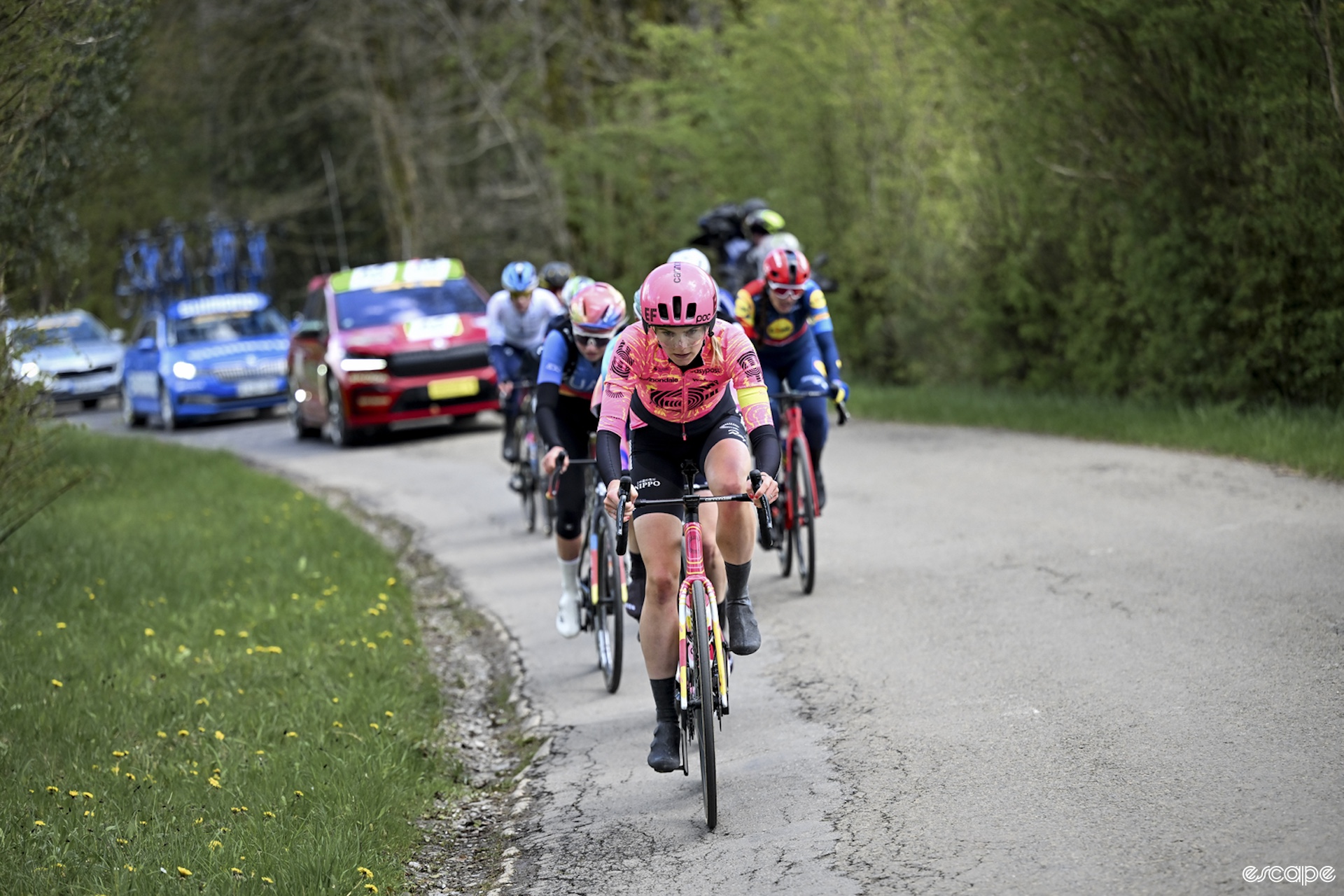
It was executed just the way we talked about it and how we wanted it to go. But then also as you say, the next day I also was really really happy with, because I was there when the girls attacked over that climb, I was further up in the group, and I was able to go up and over the climb with them. It gave me a sense of knowing that I could do it and that the [first stage] where I got a bit distanced and tried to ride across, I was like 'maybe I'm not quite with them'. But then being able to follow up with a good day, I [now know] I can do it.
You always have that doubt in your mind. You're never sure if you're going to be there or thereabouts, but it was a good day. Both days were pretty exciting for me.
AM: In terms of this year, the Vuelta was a great race, but if you compare that to the Tour de Suisse, the two are incomparable, so how did you transition from the Vuelta to the Tour de Suisse?
KC: After [Liège-Bastogne-Liège], it was a special and important race for me – I wasn't maybe as known before Liège happened. [After] I had a lot of people contacting me and a lot of stuff was happening around cycling, I found that quite overwhelming. It was a busy time. I was also trying to do testing in the wind tunnel straight after the race and I didn't get much time at home. I was quite tired at the Vuelta. Last year, I did something like four races, and that was a big year. By the time I'd done the Vuelta, I'd done the same amount of races already.
I performed well at the Vuelta, but maybe not quite what we would have expected. After, I went home and had a really good rest period and sort of eased back into it, which I've never really done before, a midseason rest. So I had a great break and then into a really hard training period and team camp in Denia [Spain], that led into Tour de Suisse, and then a few days in Girona. It was more important to have some rest and recovery and switch off at home before more hard training.
AM: So the Giro next?
KC: Yep, yeah. Giro's next up so trying to prepare.
AM: How do you feel going into the Giro having had such a successful Tour de Suisse?
KC: I'm really excited. Nervous because it's eight days of racing; it's obviously some massive stages later on. Looking at those days that follow 2,400 meters of climbing and then nearly 4,000 meters of climbing and then 2,000, I think it's going to be a really big later few days. The eight days of stage racing is new to me, and a lot of the girls I know have done it before, but last year after four days of Tour de Suisse I was broken. I was so tired I needed a rest week. Now I've sort of adapted, but then again coming into these Grand Tours of eight days, it's not 21 like the men, but it is always full gas and I think it takes time to adapt to that many days in a row of hard work.
I'm always a little nervous, but really excited because I know the more I do the better I'll get at adapting to them. I think that's one of my biggest things is just racing more to help me learn.
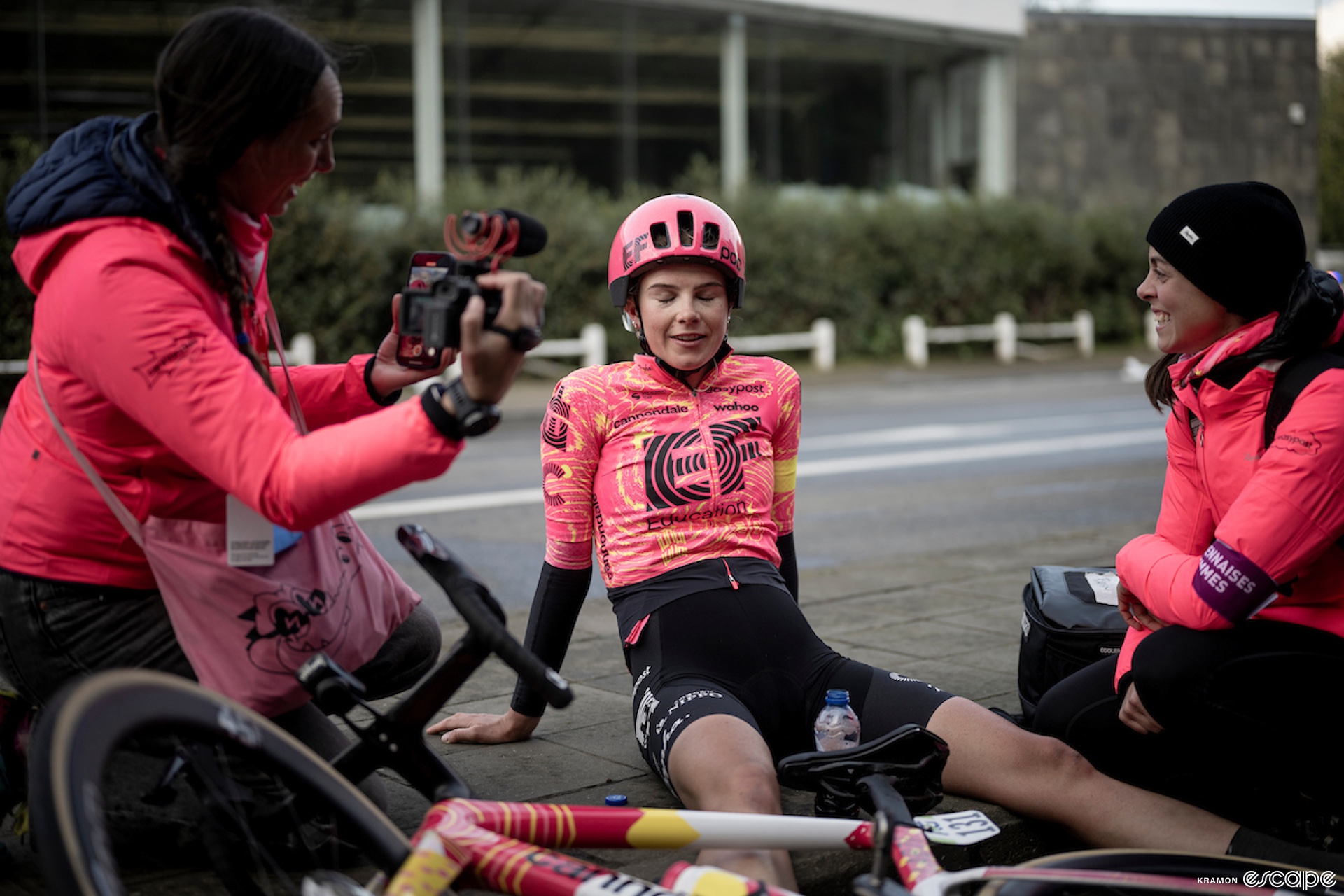
AM: I mentioned this already, but you're really new to the sport. How did you get into cycling in the first place? And then how much of a whirlwind has it been to, in two years, go from brand new to a GC contender at a Grand Tour?
KC: I was a swimmer for a long time and then I met my husband who was a triathlete and I just wanted to hang out with him more. So I tried some running and biking and then I started to race, but I never really fell in love with it. I think running was my Achilles heel, I just never ... as I kid I used to sit in the bushes at cross country to avoid it, like the plague, so it was never going to be the sport for me. I got a bit injured running as well and my coach at the time was like "You should enter New Zealand nationals." I entered the age group nationals and did quite well. Then I met my old coach Patrick Harvey, whose daughter [Mikayla] is in UAE [Team ADQ], he asked me what I thought about road cycling and I said I didn't know much about it. I didn't know anything about it from school or [anything about] this world over here [in Europe].
He introduced me to it and I did a bit of racing in New Zealand and then he signed me to ride in the UK, and that year I did my first Elite Nationals and won my first U23 ITT title and then went to Ocenania and came over to Europe for the first time. And that was just insane. When I first arrived I couldn't understand all these people who were supporting a sport that I had known nothing about; all these fans turning up with photos of me wearing a [Torelli-Cayman Islands-Scimitar] skinsuit I had only worn once, asking for an autograph before I'd even raced in Europe.
The more I got into it the more I enjoyed it – the whole atmosphere over here and the world around cycling, it's quite incredible. We see it a lot in New Zealand with the All Blacks [rugby union team].
AM: Especially in Belgium and the Netherlands where cycling is huge.
KC: I didn't know what was going on! All these races, and then you had all these laps where you could win money, it was chaos to me!
AM: How are you feeling now? You've had two years racing in the pro peloton.
KC: My first year I did five or six European races, and then I broke my collarbone so I went back home to recover from that and then I joined [Jumbo-Visma] and that was a really hard season for me, with them. It was a massive shock to the system with the WorldTour racing and the step up but also organization and just different cultures. I felt worlds away from my family and my home. I felt so out of my depth, which I still do now, but I think I've come into a much easier environment with [EF Education-Oatly-Cannondale]. They understand and have really helped me try to learn how to cope with being away from home. They've given me a lot of resources and put a lot of work into helping me learn.
AM: When you signed with Visma-Lease a Bike, what were their expectations for you, knowing that you didn't have much racing experience?
KC: Looking back at it I was really excited by [Jumbo-Visma]. They were [one of] the world's best teams, a lot of people say they have the world's best rider in Marianne [Vos]. She was, always is, my role model. I still love her. But I think they didn't look enough into the kind of rider I was, the lack of racing and understanding I had in the peloton itself. I wasn't the best fit for them either. I don't think they had enough resources or time to put into me.
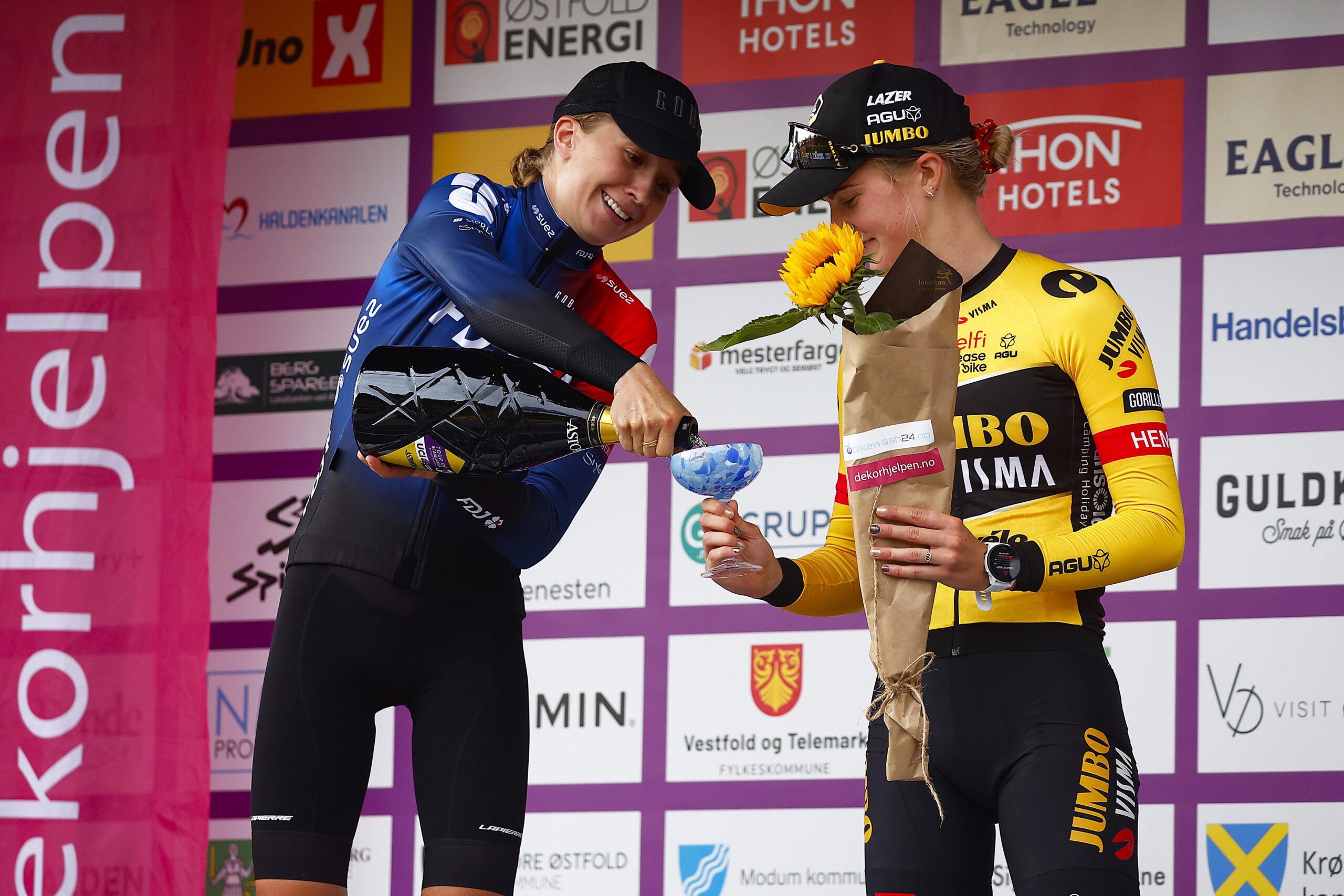
AM: What was it like switching to EF? Did you have early-season conversations about your role within the team?
KC: Coming into the team ... I love Esra [Tromp] to pieces. I loved having her in Jumbo, she left really early on [after I came] into the team. She knew she was signing me again as a project to EF, and we talked with my coach who is also the team coach and the directors and just came up with a plan that this year we want to call it my learning year. I want to just really learn and absorb all the information. Learn the skills, what's happening in the peloton, racing in the bunch, also with my performance and nutrition, learning how to use altitude. For them, they had no expectations on results, they weren't trying to put pressure on me or anything and I think that's really worked to my benefit. They've given me a lot of space to be able to just learn and enjoy racing my bike and understand why people do this for a long time.
I signed with the team for one year because, after last year, I really was at the point of being like "I don't think this is something I actually want to do." I decided to give it one more try but I couldn't see myself doing this for a long time. I didn't enjoy going to races. I enjoyed training but not the races whereas now, it's the other way around. I really look forward to going to the races and being there with my team. It's really changed my mindset.
AM: How is the team handling not having a focus on race results after you've had such an incredible Tour de Suisse? Going into the Giro it would be hard not to look at the race and think a result is within reach.
KC: We've spoken a bit about the upcoming race so they're really good at not making it a now thing. Ya, of course, we want results, I always want to do well, I don't go to races to do a bad job. Now we look at the Giro as a means to learn for two years time, to be able to be a super-confident GC rider and to learn how not to lose time and be more confident in the peloton. If we can give it a go on a stage or two, and get a higher GC result, that would be great but they're still not in the mindset ... they wouldn't be angry with me if I didn't achieve a really good GC result. At Swiss when I came off, everyone was disappointed for me, I was disappointed for myself, but no one was angry. There's nothing you can do.
In the Giro, they'll give me the best support they can and I'll try not to lose as much time as possible but it's all still part of learning how to be a GC rider and how to cope with eight days in a row and being on the ball for eight days.
Of course Demi, she's the best rider in the world right now, the best tour rider, but you look back a few years ago and she didn't know how to be a GC rider and not lose time, but she's learned over the last three or four years.
AM: It's not just you the team has taken this approach with. When you see you all win, even early in the season, it's refreshing to see the team's reaction to those wins. You can see how you all greet each other after those wins, of course, it's a goal, but it's not the be-all end-all.
KC: It's part of our culture. Our team is full of riders that can win. We see each other and how hard we work, and how hard we train, and I believe everybody in my team can win and achieve really good results. I know that all of my teammates are doing the best they can so when the result comes it's really nice, but when it doesn't come we know we are all giving 100%.
Being a new team and all coming together from different teams and different parts of the world, being quite international from different lives and different ages, had helped to build a community in our team where we appreciate each other on and off the bike.
AM: How has it been for your family? If you didn't grow up watching the Tour, has it been kind of a weird experience for them to watch you get into cycling and discover this whole new world?
KC: I am really fortunate that I'm really close with my parents and my brother and they've always been along for the ride, whatever I was doing. They've come over every year to watch me. We all get to travel overseas and they watch me ride around on a bike like a mad person. Last year, they saw it in a different light. They could appreciate it a lot more. This year, they came over for Tour de Suisse and now they've grown to learn and love it as much as I do.
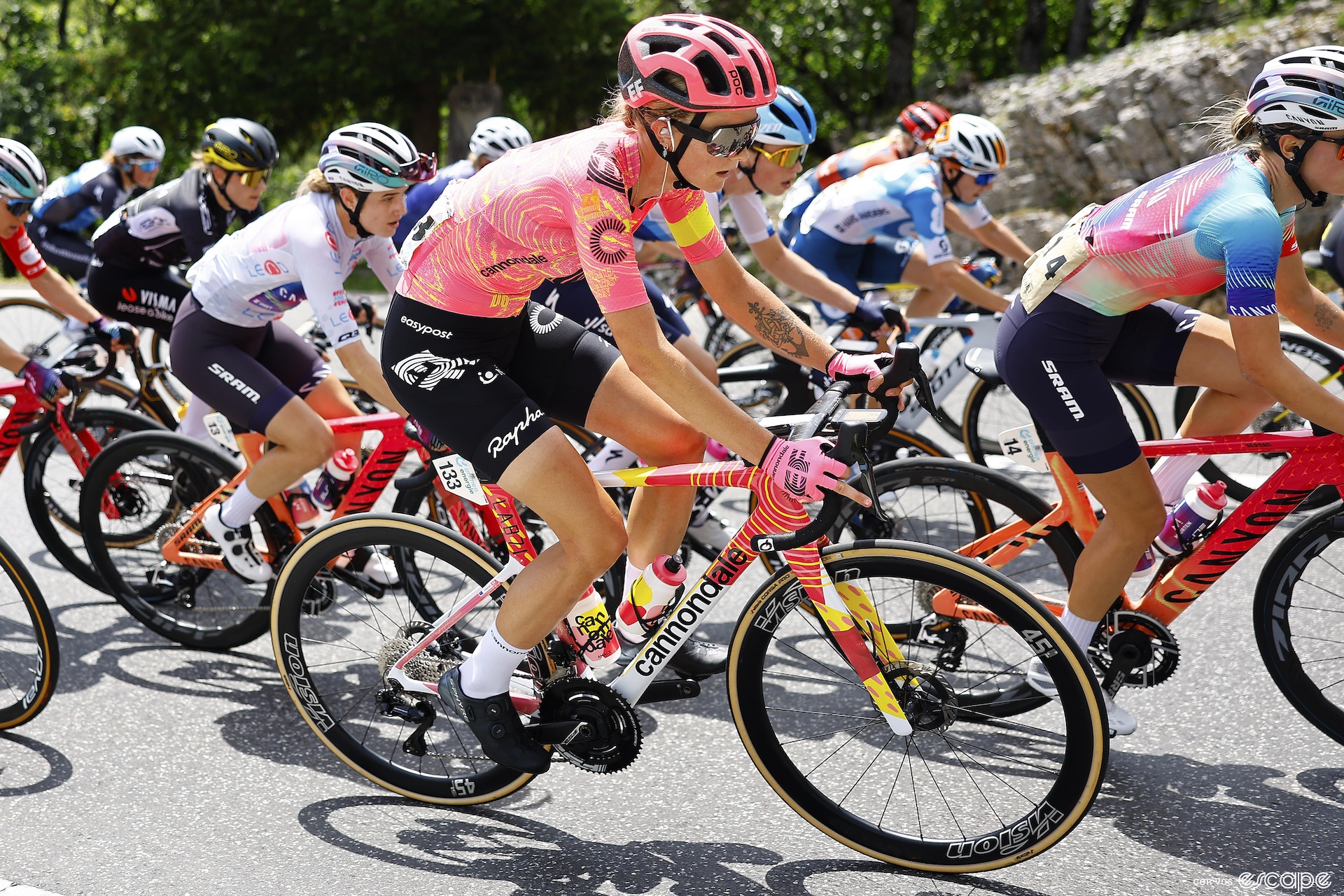
Some of my friends back home have also fallen in love with the sport. My auntie and uncle will stay up until 2am to watch; it could be men's events as well. People around me started to fall in love with cycling. My dad's really into it, and my mum, she's the most refreshing person to have come over to Europe – she couldn't care if I won or lost. Straight after she'll be like "I'll get some Swiss chocolate, there's a really nice chocolate shop down the road." It's the most refreshing thing when someone is completely oblivious to what else is going on.
In my home town, people know I'm a cyclist and that I ride a bike, but where I'm from in New Zealand they don't understand what it's like over here. I really enjoy going home for the summer and becoming Kim, the goofy person, again. It's a nice balance.
AM: How far away are you from Hobbiton?
KC: I used to live an hour away when I was growing up but now I'm at the polar opposite end.
AM: But you've seen the [Lord of the Rings] movies?
KC: Oh ya. I love the movies, I've watched them way too many times. A family friend had their birthday party in Hobbiton and they rented out the whole venue. We had the Green Dragon bar all set up for a big dinner there and got to drink from the pub and everything.
AM: Which movie is your favourite?
KC: That's a hard question. The first one.
AM: So, the community you grew up in might not know about cycling but they know about the Olympics. How does it feel to be selected for the Olympics?
KC: It was a massive shock. Last year I was put on the long list, and to be honest that already blew my mind. They sent me an email to say that I'd been selected and I was at the Vuelta and I was in tears. I was with my soigneur, she was giving me a massage and me and her are really close, she knows a lot about New Zealand. So we were jumping up and down and I was crying. It felt really unexpected and then being able to tell my family and friends was a really big moment. Most people understand the Olympics, it's worldwide. I feel very privileged but also still a bit shocked saying it out loud. When it comes out of my mouth I still have to pinch myself.
Cadzow is lining up alongside Magdeleine Vallieres, Clara Koppenburg, Letizia Borghesi, Megan Armitage, Clara Emond, and Nina Kessler at the Giro d'Italia on Sunday where she is a favourite for the final two stages of the race. But as she said, the goal is learning, with an eye on future editions of the Italian Grand Tour.
Did we do a good job with this story?

